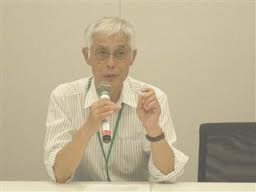Speech — “Inside North Korea”

Address to International Media Forum
Mr. Hiroshi Kato, executive director of LFNKR, was invited to the International Media Forum event titled “Inside North Korea” held on April 1 at Roppongi Hills in Tokyo. The Forum had 41 participants, including NGO groups, Japanese and foreign media and diplomats. Mr. Kato’s gave an outline of this group’s activities along with some specific figures.
Good evening ladies and gentlemen.
It is a great honor to be invited to speak at the International Media Forum.
I am Kato Hiroshi, executive director of Life Funds for North Korean Refugees. We are a Japanese citizens’ humanitarian, human rights group dedicated to the rescue of North Korean refugees.
I was requested to speak today about the activities of Life Funds for North Korean Refugees and the Report of “Commission of Inquiry” on the Situation of human rights in the Democratic People’s Republic of Korea.
First let me briefly talk about our organization. Our main aim is to rescue people whose lives are in danger, and help them reach a third country safely.
So far, we have helped about 300 North Korean refugees successfully resettle in South Korea, Japan, Australia, Canada, the US and England.
The total number of North Korean defectors who have resettled in South Korea now exceeds 26,000. Out of that total, we have helped over 300 people, working independently as well as in cooperation with South Korean organizations.
More than 200 defectors have resettled in Japan, mainly in the Tokyo and Osaka areas. Life Funds has directly assisted half of these defectors, or about 100 people.
We have also directly assisted six of the 200 or so defectors who have resettled in the US; one in Australia; two in Canada and two in England.
Our mission is to provide North Korean defectors with food, clothing, shelter, medicine and money for medical treatment.
Life Funds has actively advocated for the recognition of North Korean defectors as refugees as defined by the international conventions. If they are returned to North Korea, they are in danger of being harshly punished, including by repressive social discrimination or even public execution.
According to the spirit of the Refugee Convention, North Korean defectors are refugees. This is known as the principle of non-refoulement, and countries which are signatories to the Convention on Refugees are obliged to uphold it.
However, the reality is quite different. China, despite being a signatory to the Convention on Refugees does not recognize North Korean defectors as refugees. China’s official position is that North Korean refugees do not exist, that they are illegal migrants entering China illegally. They are arrested for breaking Chinese domestic laws and forcibly repatriated to North Korea.
The Chinese government warns people living in the area bordering North Korea not to protect North Koreans or to offer them food, shelter, clothing, or work. Moreover, it urges them to report North Koreans in the area to the police. Such informants remain anonymous and receive cash rewards for their information.
According to Chinese law, sheltering North Korean defectors violates Chinese domestic law. So since NGOs helping North Koreans are breaking Chinese law, they are subject to arrest, deportation, or prison time.
I myself was arrested by Chinese intelligence agents in October 2002 when I was in Dalian arranging delivery of winter clothes and food with a local coordinator. I was detained and interrogated for seven days, during which time I was tied in a chair and not allowed to sleep.
In March of 2013, the Human Rights Council established a Commission of Inquiry following the UN Special Rapporteur’s Report on Human Rights in North Korea. This was to allow North Korean human rights violations to be investigated in order to see whether they constituted crimes against humanity. Testimony from over 200 people was heard in public and private hearings, examined, and culminated in a 372-page report titled, “Report of the detailed findings of the Commission of Inquiry on human rights in the Democratic People’s Republic of Korea”.
China knows all about the human rights abuses being committed against North Koreans. And China itself is in fact a victim – two of its nationals were abducted from Macau by North Korea – and yet it does nothing to resolve the situation, or even file a complaint with North Korea.
What is even harder to take is China’s silence on the treatment of North Korean women who are forcibly repatriated to North Korea. If they are found to be pregnant upon their return, they are forced to abort the so-called “Chinese seed” that they are carrying. This is blatant racism, yet China says and does absolutely nothing about such an outrage. It’s no surprise that there is not even a word for “human rights” in the Chinese dictionary.
The conclusion and recommendations of the COI report are as follows:
Systematic, widespread and gross human rights violations, have been and are committed by the DPRK, its institutions and officials. In many instances, the violations of human rights found by the Commission constitute crimes against humanity.
With respect to the response of the international community, the Report says this:
The United Nations must ensure that those most responsible for the crimes against humanity committed in the DPRK be held accountable. Options to achieve this end include a Security Council referral of the situation to the International Criminal Court or the establishment of an ad hoc tribunal by the United Nations.
Life Funds for North Korean Refugees cannot stand silent while some of the most egregious human rights violations ever committed are taking place right in front of us.
For the sake of peace, stability, and progress in East Asia, we must find a way forward out of this dark period in our history.





